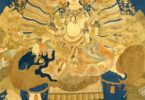《百喻经》
[The] Sūtra [Of A] Hundred Parables
(七四)出家凡夫贪利养喻
[74] Parable [Of] Ordinary Beings [Who Have] Left [The] Household [Life] Greedy [For] Profit [And] Gain
昔有国王设于教法,诸有婆罗门等在我国内制抑洗净,不洗净者,驱令策使种种苦役。
[In the] past, [there] was [a] country’s King [who] established [that] those giving teachings, all existing Brahmins [and] others in my country, [are] enforced [to] wash [themselves] clean, [with] those not washing [themselves] clean, driven [off and] ordered [for] all kinds [of] forced labour.
有婆罗门空捉澡灌,诈言洗净,人为其著水即便泻弃。便作是言:「我不洗净王自洗之。」
[There] was [a] Brahmin [who] emptily clutched [a jar for] bathing [and] pouring, lying [that he has] washed [himself] clean. [When other] people for him put water [in it, he would] immediately drain [it] away. Then making this statement, ‘I [will] not wash [myself] clean. [The] King [can] personally wash himself.’
为王意故用避王役,妄言洗净实不洗之。
Because [of the] King[‘s order], with [the] cause [of] avoiding [being the] King’s forced labour, [he] falsely said [that he has] washed [himself] clean, [but] truly [did] not wash himself.
出家凡夫亦复如是,剃头染衣内实毁禁,诈现持戒望求利养,复避王役,外似沙门,内实虚欺,如捉空瓶但有外相。
[Those who have] left [the] household [life are] likewise thus, [having] shaven [their] heads [and] dyed [their] robes, internally truly destroying [the] prohibitive [precepts] (禁戒), pretending [to] appear [to be] upholding [the] precepts, hoping [to] seek profit [and] gain. Again, [for] avoiding [the] King’s forced labour, externally resembling Śramaṇas, internally truly [with] hypocrisy cheating, like [those] clutching empty jars, only having external forms.
[Note: Both monastics and laypersons should be true to themselves and everyone else. There should be congruence and consistency, with their external wholesome appearances and good practices matching their internal pure motivations. Otherwise, their ongoing deceit will only create evil karmas (恶业) that lead to suffering, later in this life and in later lives.]
Namo Amituofo : Translation and notes by Shen Shi’an
上个喻
Previous Parable:
诈言马死喻
[73] The Parable Of Lying About The Horse’s Death
https://purelanders.com/2023/10/07/73-the-parable-of-lying-about-the-horses-death-from-the-sutra-of-a-hundred-parables
下个喻
Next Parable:
驼瓮俱失喻
[75] The Parable Of The Camel And Urn Together Lost
https://purelanders.com/2023/10/07/75-the-parable-of-the-camel-and-urn-together-lost-from-the-sutra-of-a-hundred-parables
全百喻
All Hundred Parables:
https://purelanders.com/baiyu





